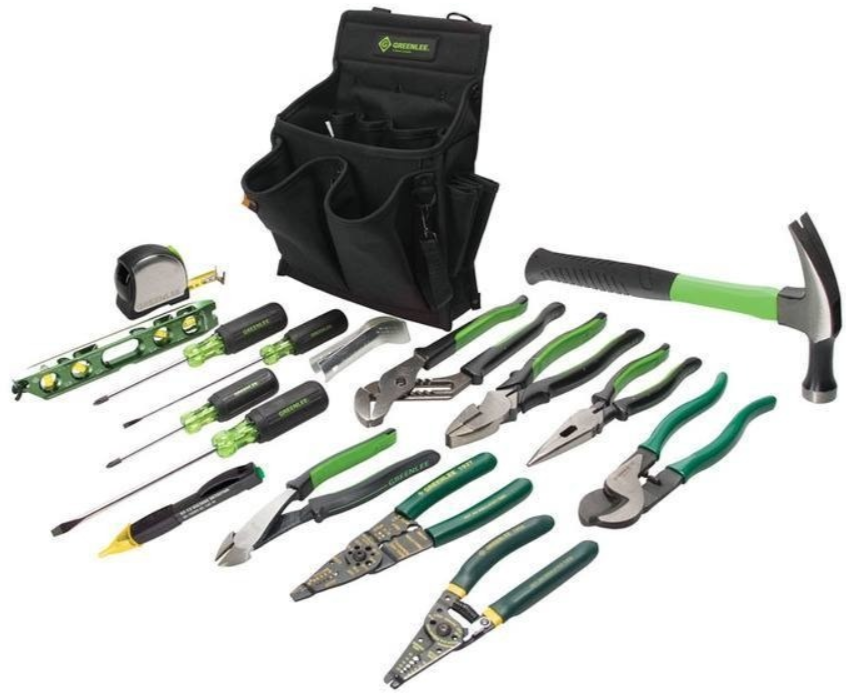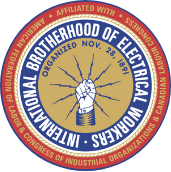What is a lineman?
A lineman is responsible for the installation, repair, and maintenance of overhead and underground power lines that bring electrical current to homes and businesses providing them with electricity. A Lineman works in underground trenches and vaults, as well as overhead structures like powerlines, streetlights, transformers and more. A lineman works on transmission and distribution lines that transfer electroactivity from a powerplant to business and homes. A lineman has many different aliases you may have heard line worker, linesman, power lineman, electrical lineman, groundman, powerline technician, and more.
It takes years of training to become a knowledgeable lineman. A lineman starting out in the trade will be a lineman apprentice where he will learn the skills needed to become a journeyman lineman. Lineman can work for a utility company, an energy company or telecommunications company. Most linemen work with other linemen, this is known as a line crew consisting of typically 3-4 linesmen. Linemen report to managers or supervisors who tell the line crew where an electrical line is down and inform them if the electrical line in the given area was installed correctly and working properly.
Learn more about How to Become a Lineman
The Bureau of Labor Statistics shows the projected job growth for Linemen is 6% through 2024. With the projected job growth, development of cities in the US as well as the inevitable repairing and replacing of equipment in the industry makes a stable career for a lineman.
Job duties of a lineman include:
- Planning and Initiating projects
- Prepares work sites, assembles warning signs and secures areas
- Maintains knowledge of and implements safety procedures
- Operates diggers, bucket trucks, hand tools near and around electrical distribution lines
- Operates live-line tools to connect and disconnect distribution lines and components
- Stringing New Wire or Maintaining Old Wire
- Installing and Maintaining Insulators
- Installing and Maintaining Transformers and Other Equipment
- Supervising Groundmen and Apprentices
- Installing, and Maintaining an Underground Distribution Systems
- Assembly and Erection of Substation
- Installing and Maintaining Traffic Signals and Outdoor Lighting
- Participates in on-call status for emergencies
- Tree Trimming
- Use of Tools
Traits of a successful lineman:
- Knowledgeable of electrical systems
- Skills in mathematics including geometry, algebra, and industrial math
- Knowledge of basic public safety and security measures
- Knowledge of tree trimming
- Physical strength and stamina
- Ability to climb poles and work at high elevations
- Willing to work in all weather conditions
- Ability to read and interpreting electrical wiring diagrams
How much money does a lineman make?

The national average annual salary for a lineman is $57,819. Journeyman linemen make an average of $45 to $50 per hour, depending on the region they work in. How much linemen are compensated is based on where they live. Although a lineman has the ability to double their annual salary for the year by working overtime. Overtime is offered most when there are damages after storms that need to be repaired as soon as possible, allowing lineman to work long hours for days or weeks to repair cities affected by storms.
Average Lineman Salary by State
Numbers provided by zip recruiter
| State | Annual Salary | Monthly Pay | Weekly Pay | Hourly Wage |
| Massachusetts | $64,344 | $5,362 | $1,237 | $30.93 |
| Hawaii | $64,158 | $5,347 | $1,234 | $30.85 |
| Rhode Island | $61,896 | $5,158 | $1,190 | $29.76 |
| North Dakota | $60,770 | $5,064 | $1,169 | $29.22 |
| Alaska | $60,495 | $5,041 | $1,163 | $29.08 |
| Nevada | $60,018 | $5,002 | $1,154 | $28.85 |
| Washington | $59,967 | $4,997 | $1,153 | $28.83 |
| South Dakota | $58,995 | $4,916 | $1,135 | $28.36 |
| New York | $58,740 | $4,895 | $1,130 | $28.24 |
| Oregon | $58,329 | $4,861 | $1,122 | $28.04 |
| Maryland | $57,850 | $4,821 | $1,112 | $27.81 |
| Kansas | $57,819 | $4,818 | $1,112 | $27.80 |
| Nebraska | $56,778 | $4,732 | $1,092 | $27.30 |
| New Hampshire | $56,740 | $4,728 | $1,091 | $27.28 |
| Kentucky | $56,442 | $4,704 | $1,085 | $27.14 |
| Virginia | $56,034 | $4,670 | $1,078 | $26.94 |
| Colorado | $54,663 | $4,555 | $1,051 | $26.28 |
| South Carolina | $54,658 | $4,555 | $1,051 | $26.28 |
| Mississippi | $54,204 | $4,517 | $1,042 | $26.06 |
| Delaware | $54,112 | $4,509 | $1,041 | $26.02 |
| California | $54,082 | $4,507 | $1,040 | $26.00 |
| Vermont | $53,410 | $4,451 | $1,027 | $25.68 |
| Oklahoma | $52,770 | $4,398 | $1,015 | $25.37 |
| Wyoming | $52,630 | $4,386 | $1,012 | $25.30 |
| Connecticut | $52,400 | $4,367 | $1,008 | $25.19 |
| Arkansas | $51,508 | $4,292 | $991 | $24.76 |
| Michigan | $51,252 | $4,271 | $986 | $24.64 |
| Illinois | $51,230 | $4,269 | $985 | $24.63 |
| West Virginia | $51,056 | $4,255 | $982 | $24.55 |
| Pennsylvania | $50,810 | $4,234 | $977 | $24.43 |
| Idaho | $50,720 | $4,227 | $975 | $24.38 |
| New Jersey | $50,433 | $4,203 | $970 | $24.25 |
| Maine | $50,317 | $4,193 | $968 | $24.19 |
| Montana | $50,030 | $4,169 | $962 | $24.05 |
| Missouri | $49,955 | $4,163 | $961 | $24.02 |
| Arizona | $49,515 | $4,126 | $952 | $23.81 |
| Minnesota | $49,438 | $4,120 | $951 | $23.77 |
| Tennessee | $49,339 | $4,112 | $949 | $23.72 |
| Indiana | $49,198 | $4,100 | $946 | $23.65 |
| Texas | $49,034 | $4,086 | $943 | $23.57 |
| Wisconsin | $49,010 | $4,084 | $942 | $23.56 |
| Ohio | $48,983 | $4,082 | $942 | $23.55 |
| Utah | $48,431 | $4,036 | $931 | $23.28 |
| Louisiana | $47,945 | $3,995 | $922 | $23.05 |
| Georgia | $47,766 | $3,981 | $919 | $22.96 |
| Iowa | $47,315 | $3,943 | $910 | $22.75 |
| Alabama | $46,649 | $3,887 | $897 | $22.43 |
| North Carolina | $46,576 | $3,881 | $896 | $22.39 |
| New Mexico | $46,553 | $3,879 | $895 | $22.38 |
| Florida | $45,021 | $3,752 | $866 | $21.64 |
A few US States that have a higher national average salary for a lineman job are Massachusetts, Hawaii and Rhode Island. Massachusetts tops the national average with $6,524 (11.3%) above the $57,819 and Rhode Island at 7.1% higher. As stated before, linemen can make significantly more money by working overtime.
What Are Tools of the trade: Lineman Tools
 A lineman must be very well versed in the tools of the trade. As a lineman apprentice, you will be taught the safe and proper use of hand tools, power-assisted tools, heavy equipment and industry-specific tools.
A lineman must be very well versed in the tools of the trade. As a lineman apprentice, you will be taught the safe and proper use of hand tools, power-assisted tools, heavy equipment and industry-specific tools.
Hand Tools
- Hammer
- Pliers
- Screwdriver
- Lineman knife
- Insulated tools
Climbing Tools
- Safety belt
- Body belt
- Climbers
- Climbing boots
Power-Assisted Tools
- Hand drills
- Gas-operated auger
- Air hammer
- Electric screw gun
- Fiber optic fusion splicer
- Electric roto drill hammer
- Air compressor
- Roto stripper
- Hydraulic bender
Hot Sticks and Grounding Cables (specialized tools for handling power lines)
- Switch stick
- Universal gripall stick
- Link stick
- Auxiliary arm stick
- Wire tongs
- Lever lift
- Gin pole
- Personal protective grounds
Top Manufacturers of lineman Tools and Equipment
Learning more about What Are the Main Tools that Linemen Need?
It takes years of training and expertise to become a knowledgeable lineman. A lineman starting out in the trade will be a lineman apprentice where he will learn the skills needed to become a journeyman lineman. The job of a lineman is a growing industry with room for growth and the ability to make a good living for yourself. There are many tools that lineman use, at Divergent Alliance we only supply the best, safest and durable tools made by the best manufacturers in the industry. Give us a call at (847) 531-0559 to find out more about the lineman tools and electrical utility tools we provide to professionals across the United States.





